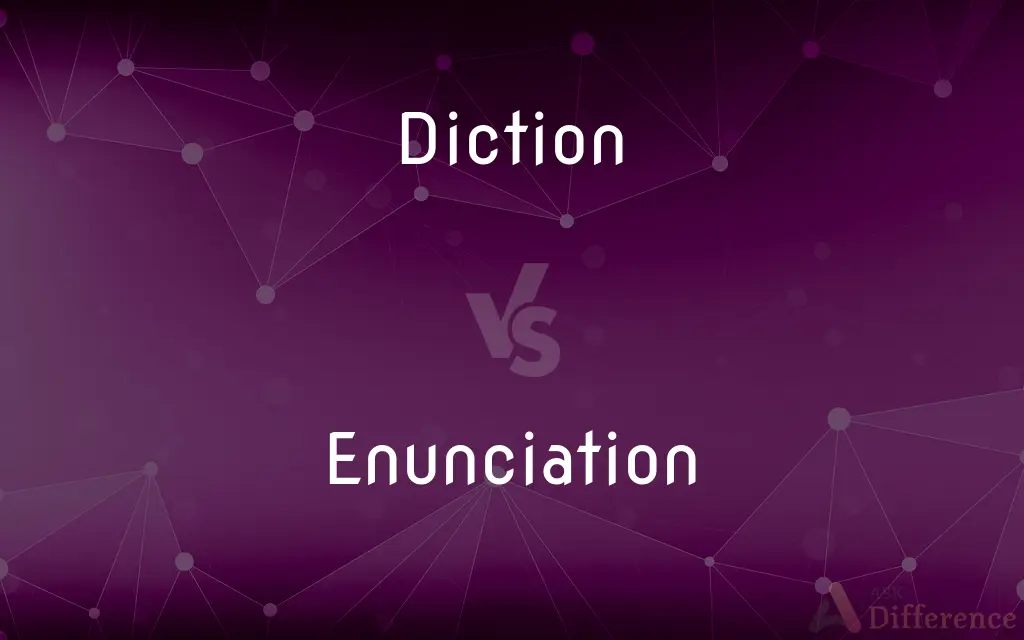Diction vs. Enunciation — What's the Difference?
By Fiza Rafique & Maham Liaqat — Updated on April 30, 2024
Diction refers to word choice and style in speech or writing, focusing on clarity and effectiveness; enunciation is about the clarity of pronouncing words.

Difference Between Diction and Enunciation
Table of Contents
ADVERTISEMENT
Key Differences
Diction involves selecting words that effectively convey a message, often influenced by the speaker's vocabulary and the context of the communication. On the other hand, enunciation is primarily concerned with how clearly these words are pronounced, focusing on articulation to ensure comprehensibility.
While diction can be evaluated for its appropriateness and impact in conveying specific tones or emotions, enunciation deals with the physical aspects of speech, such as clarity of sound and precision in vocal delivery. This makes enunciation essential for effective communication, especially in noisy environments.
Good diction enhances the quality of a message by using vocabulary and expressions suited to the audience and situation, which can persuade or inform effectively. In contrast, clear enunciation ensures that the words themselves are understood, regardless of the complexity of the vocabulary used.
Diction is often reflective of a person’s education or background, showcasing a range of linguistic skills and a depth of vocabulary. Whereas, good enunciation is a skill that can be learned and improved through practice and is critical in fields like broadcasting or public speaking.
Effective diction can subtly influence perceptions and emotions through nuanced word choices and phrasing. However, without proper enunciation, even the most carefully chosen words can lose their intended impact, as listeners may struggle to understand the spoken words.
ADVERTISEMENT
Comparison Chart
Definition
Choice of words in speech or writing
Clarity of pronouncing words
Focus
Effectiveness and appropriateness of words
Clarity and precision in speech
Skills
Vocabulary use, style, expression
Articulation, pronunciation
Influences
Education, background, context
Practice, vocal training
Importance
Persuasion, conveying emotions and tone
Comprehensibility, effectiveness of speech
Compare with Definitions
Diction
The clarity and effectiveness of one's choice in language.
The poet’s diction brought the characters to life.
Enunciation
The clarity with which someone speaks.
Clear enunciation is essential for effective communication.
Diction
The style of enunciation in speaking or singing.
His diction was so clear that everyone in the room could understand the subtle nuances of his argument.
Enunciation
The act of pronouncing words.
Her enunciation was so precise that even the back row could hear every syllable.
Diction
The choice and use of words and phrases in speech or writing.
Her diction was impeccable, enhancing the persuasive power of her speech.
Enunciation
A style of speaking or singing characterized by clear pronunciation.
His enunciation during the presentation was flawless.
Diction
The accent, inflection, intonation, and speech-sound quality manifested by an individual speaker.
His unique diction made his performances memorable.
Enunciation
The skill of speaking so that each word is clearly heard.
She took classes to improve her enunciation.
Diction
Pronunciation and articulation as elements of speech.
Effective diction involves both the right words and the right delivery.
Enunciation
The manner of articulating words clearly and distinctly.
A good actor must master enunciation to be understood on stage.
Diction
Diction (Latin: dictionem (nom. dictio), "a saying, expression, word"), in its original meaning, is a writer's or speaker's distinctive vocabulary choices and style of expression in a poem or story.
Enunciation
To pronounce; articulate.
Diction
Choice and use of words in speech or writing.
Enunciation
To state or set forth precisely or systematically
Enunciate a doctrine.
Diction
Degree of clarity and distinctness of pronunciation in speech or singing; enunciation.
Enunciation
To announce; proclaim.
Diction
Choice and use of words, especially with regard to effective communication.
Enunciation
To pronounce words; speak aloud.
Diction
The effectiveness and degree of clarity of word choice and expression.
His poor diction meant that most of the audience didn't really understand the key points of the presentation.
Enunciation
The act of enunciating, announcing, proclaiming, or making known; open attestation; declaration.
It was time for the enunciation of an important truth.
Diction
(theatre) Enunciation, pronunciation.
Enunciation
Mode of utterance or pronunciation, especially as regards fullness and distinctness or articulation.
She speaks with an impressively clear enunciation.
Diction
Choice of words for the expression of ideas; the construction, disposition, and application of words in discourse, with regard to clearness, accuracy, variety, etc.; mode of expression; language; as, the diction of Chaucer's poems.
His diction blazes up into a sudden explosion of prophetic grandeur.
Enunciation
That which is enunciated or announced; words in which a proposition is expressed; formal declaration
Diction
The articulation of speech regarded from the point of view of its intelligibility to the audience
Enunciation
The act of enunciating, announcing, proclaiming, or making known; open attestation; declaration; as, the enunciation of an important truth.
By way of interpretation and enunciation.
Diction
The manner in which something is expressed in words;
Use concise military verbiage
Enunciation
Mode of utterance or pronunciation, especially as regards fullness and distinctness or articulation; as, to speak with a clear or impressive enunciation.
Enunciation
That which is enunciated or announced; words in which a proposition is expressed; an announcement; a formal declaration; a statement.
Every intelligible enunciation must be either true or false.
Enunciation
The articulation of speech regarded from the point of view of its intelligibility to the audience
Common Curiosities
Why is enunciation important in public speaking?
Clear enunciation ensures that the message is understood by all audience members, regardless of their position in the venue.
What is the main difference between diction and enunciation?
Diction refers to the choice and use of words, while enunciation is about how clearly those words are pronounced.
Does diction vary from one language to another?
Yes, diction can vary widely between languages and is influenced by cultural and linguistic norms.
How do actors train in diction and enunciation?
Actors often undergo rigorous training to master both precise word choice and clear articulation to enhance their performances.
Is diction more important for writers or speakers?
While essential for both, diction plays a particularly crucial role for writers, as it directly affects the reader’s interpretation of the text.
Can good diction compensate for poor enunciation?
No, even with excellent diction, poor enunciation can hinder the effectiveness of communication by making speech difficult to understand.
How can one improve their diction?
Expanding vocabulary and understanding the audience and context can significantly improve one’s diction.
What role does enunciation play in effective communication?
Proper enunciation makes the speech intelligible and can prevent misunderstandings.
How does diction affect one’s professional image?
Good diction can enhance a professional image by showing mastery in language use, which can influence credibility and authority.
Are diction and enunciation equally important in all professions?
Their importance varies depending on the profession, but both are crucial in roles involving communication.
What is the best way to practice good enunciation?
Regular practice, vocal exercises, and possibly speech therapy can improve enunciation.
How does one choose the right diction for a specific audience?
Understanding the audience’s preferences, expectations, and cultural background can guide the appropriate choice of diction.
Can enunciation be improved with technology?
Yes, various software and training programs are designed to help improve pronunciation and articulation.
Do diction and enunciation contribute to effective teaching?
Yes, both are essential in teaching to ensure that the information is conveyed clearly and understood by students.
Is there a link between enunciation and listening skills?
Good enunciation can enhance listening comprehension, as clearer speech is easier to follow and understand.
Share Your Discovery

Previous Comparison
Courier vs. Delivery
Next Comparison
Comatose vs. ObtundedAuthor Spotlight
Written by
Fiza RafiqueFiza Rafique is a skilled content writer at AskDifference.com, where she meticulously refines and enhances written pieces. Drawing from her vast editorial expertise, Fiza ensures clarity, accuracy, and precision in every article. Passionate about language, she continually seeks to elevate the quality of content for readers worldwide.
Co-written by
Maham Liaqat















































